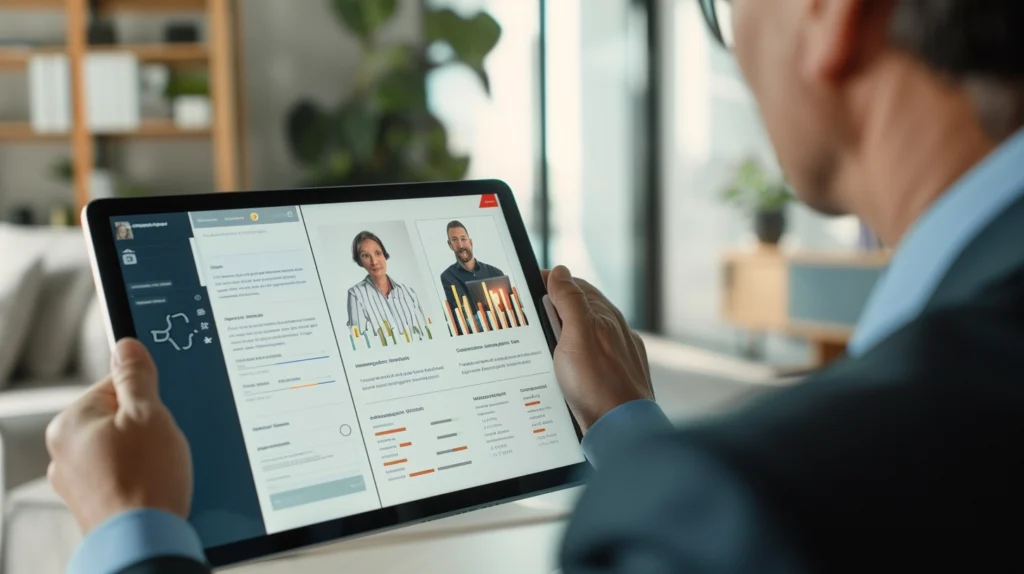Introduction

In the dynamic landscape of modern industries, the role of a Project Coordinator is pivotal. Spanning sectors such as construction, technology, and healthcare, these professionals are the backbone of project success, expertly bridging gaps between diverse teams and guiding projects to fruition. Their ability to adapt and apply their skills across various settings not only underscores their versatility but also highlights their indispensable nature in today’s fast-paced work environments.
For employers focused solely on securing the best job description template available—one that serves as a robust foundation for crafting your own hiring specifications—we invite you to download our complimentary Project Coordinator Job Description. This document is meticulously designed to integrate the fundamental principles and top practices of C9Staff’s hiring methodology, ensuring you attract and identify the most qualified candidates efficiently. Click the link below to access your direct download and start enhancing your recruitment strategy today.
Project Coordinator Job Description Template

This guide digs deep into the dual perspectives of the Project Coordinator role—catering to both ambitious candidates eager to carve out a career in this field and employers on the hunt for the linchpin that will hold their project teams together. Through a blend of practical advice and strategic insights, this article aims to arm both parties with the knowledge to either step confidently into this role or to craft the perfect team for their project needs.
As you board on this comprehensive exploration of the Project Coordinator’s duties, skills, and career trajectories, prepare to uncover the critical importance of this role. Whether you are looking to excel as a Project Coordinator or to hire one, the insights provided here will equip you with a deeper understanding and appreciation of the nuances that make this position both challenging and rewarding. Engage with us as we unpack the multifaceted nature of the Project Coordinator’s world, providing you with a clear and compelling narrative that highlights why this role is so crucial in any industry.
What is a Project Coordinator?

A Project Coordinator is fundamentally a key player in the sphere of project management. This role involves comprehensive oversight and facilitation responsibilities that bridge various gaps within project teams and between different project phases. At its core, the Project Coordinator ensures that all project elements are aligned to proceed smoothly, efficiently, and on schedule. Their responsibilities range from administrative support to maintaining project documentation, coordinating meetings, and serving as a communication link between senior management and the rest of the project team.
The evolution of the Project Coordinator role is as dynamic as the industries it serves. Originating from traditional managerial roles that were often too broad or overloaded, the need for a dedicated position focusing on the finer details and logistics of project management became increasingly apparent as projects grew in complexity and size. Over the decades, this role has been refined in response to technological advancements and shifts in organizational structures, making it indispensable in today’s project-driven work environments.
Throughout this section, you will gain an understanding of not only what a Project Coordinator does but also why this role is crucial in any project setup. Historical milestones in the field of project management, such as the introduction of digital project tracking tools and methodologies like Agile and Lean, highlight the adaptive nature of the role in meeting industry demands.
By engaging with this narrative, you are invited to appreciate the depth and breadth of the Project Coordinator’s responsibilities. This discussion will help you recognize the essential nature of this position in maintaining the integrity and success of projects across all sectors, thereby providing a solid foundation for the deeper explorations of skills, responsibilities, and career paths that follow in this guide.
Mastering Coordination: Key Roles & Responsibilities of a Project Coordinator
Key Responsibilities of a Project Coordinator

At the heart of successful project management is the Project Coordinator, a role crucial across all industries due to its core responsibilities: scheduling, resource allocation, budgeting, and stakeholder communication. These duties ensure that projects remain on track, within budget, and meet the expected quality standards, ultimately driving projects to successful completions.
However, the scope and focus of these responsibilities can vary widely depending on the industry and the size of the project. In construction, for instance, a Project Coordinator might be heavily involved in site management and safety compliance, whereas in the IT sector, the same role could focus more on software development timelines and coordination between programming teams and client needs.
Consider a Project Coordinator in a small startup: this individual might oversee nearly every aspect of project management, from initial planning to final deliverables. Contrast this with a counterpart in a large multinational corporation, where the role may specialize more in certain areas like procurement or communications, supporting broader project management frameworks.
To illustrate, let’s examine two scenarios: In a tech company, the Project Coordinator might spend a significant part of their day ensuring that software updates are aligned with customer feedback loops and that all departments are synchronized for the release date. Meanwhile, a Project Coordinator in a construction firm may prioritize safety protocol compliance and the timely sourcing of materials to avoid delays.
By addressing these differences, this section not only informs but also helps readers—whether they are aspiring to become Project Coordinators or looking to hire one—visualize the practical implications of the role in various contexts. As we transition into discussing the necessary skills and qualifications for a Project Coordinator, it becomes clear how these responsibilities shape the professional requirements and development needed to excel in this dynamic role.
Skills and Qualifications for a Project Coordinator

Essential Skills Required Across Industries To excel as a Project Coordinator, mastery in several key skills is essential. These include:
Communication: Effective communication is vital, ensuring clarity and understanding across all project stakeholders. For instance, a Project Coordinator must relay complex project details into digestible updates for different audiences, ensuring alignment and avoiding misunderstandings.
Organization: The ability to manage multiple tasks and priorities with precision is crucial. Consider the coordination of resources in a construction project; meticulous scheduling ensures that materials and labor are optimally allocated.
Problem-solving: Every project faces unexpected challenges; the ability to quickly formulate effective solutions is indispensable. For example, when a technology rollout encounters tech issues, a skilled Project Coordinator must swiftly troubleshoot or adjust timelines to maintain project momentum.
Leadership: Leading a team often without direct authority, Project Coordinators must inspire and guide team members. This could mean mediating conflicts or motivating a team during high-pressure periods to meet deadlines.
Academic and Professional Qualifications While specific qualifications can vary by industry, certain academic credentials commonly serve as a foundation:
Relevant Degrees: A bachelor’s degree in business administration, project management, or a related field is often essential. These programs provide theoretical and practical knowledge applicable across various project types.
Practical Experience: Hands-on experience in project management can be equally, if not more, valuable than formal education. Experience exposes coordinators to real-world challenges and solutions that formal education may not fully cover.
Optional Certifications Pursuing certifications can significantly enhance a Project Coordinator’s qualifications:
Certified Associate in Project Management (CAPM): This certification is ideal for those entering the field, providing fundamental knowledge of project management principles.
Project Management Professional (PMP): Recognized globally, the PMP certifies advanced project management skills and is highly regarded across industries.
As you develop these skills and consider qualifications, remember that each element is designed to equip you with the tools needed to manage projects successfully. Whether you are looking to enhance your career or aiming to hire the best, understanding these qualifications will guide you to better decisions.
Crafting the Perfect Project Coordinator Job Description
A well-crafted job description for a Project Coordinator begins with the essentials: a clear job title, a detailed list of responsibilities, required qualifications, and desired skills. These elements serve not just to define the role but also to set clear expectations for applicants.
Job Title: Make it specific, such as ‘Project Coordinator for Healthcare IT Projects,’ to immediately inform candidates of the focus area.
Responsibilities: List them in bullet points for clarity, including tasks like managing timelines, coordinating with multiple departments, and overseeing project resources.
Required Qualifications: Detail educational requirements, necessary experience, and technical skills.
Desired Skills: Highlight soft skills such as leadership, communication, and problem-solving abilities.
Reflecting Company Culture Integrating your company’s culture into the job description can significantly enhance its attractiveness. Describe your work environment, team dynamics, and core values with language that resonates with your brand’s ethos.
Company Values: If your company prides itself on innovation, describe how a Project Coordinator is expected to contribute to fostering innovation within project teams.
Work Environment: Is your team collaborative or autonomous? Specify this in the description to attract candidates who thrive in similar settings.
Writing a Description That Attracts the Right Candidates To ensure your job description stands out, use clear and engaging language that speaks directly to the candidates’ needs and aspirations.
Growth Opportunities: Emphasize the potential for professional development and career advancement within your company.
Impact: Highlight how crucial the Project Coordinator’s role is to the success of the organization, appealing to candidates who are eager to make a significant impact.
Engaging and Inviting Tone Use an inviting tone to make the job appealing. Phrases like “Join a team of passionate professionals,” or “Help us drive success in groundbreaking projects,” can make the role more attractive.
For employers focused solely on securing the best job description template available—one that serves as a robust foundation for crafting your own hiring specifications—we invite you to download our complimentary Project Coordinator Job Description. This document is meticulously designed to integrate the fundamental principles and top practices of C9Staff’s hiring methodology, ensuring you attract and identify the most qualified candidates efficiently. Click the link below to access your direct download and start enhancing your recruitment strategy today.
Project Coordinator Job Description Template

Applying for a Project Coordinator Position

Tailoring Resumes and Cover Letters When applying for a Project Coordinator position, it is essential to customize your resume and cover letter to reflect the specific requirements of the role. Highlight your relevant project management experience by detailing specific tasks you’ve managed, such as scheduling, budgeting, and team coordination. Demonstrate your leadership by mentioning any projects you have led, particularly those that are relevant to the industry you’re applying within.
Include measurable achievements that clearly showcase your effectiveness. For example, note any projects completed ahead of schedule or under budget, and describe any process improvements you implemented. These specifics will not only demonstrate your competency but also quantify your impact, making a stronger case for your candidacy.
Preparing for Interviews Interviews for Project Coordinator roles often focus on situational and behavioral questions. Prepare to discuss detailed examples from your past work, such as a project you managed from inception to completion. Explain the scope of the project, your role, and the outcome, emphasizing your strategic and tactical decision-making processes.
Be ready to discuss how you handle challenges, such as tight deadlines or project scope changes. Employers value problem-solving skills and adaptability, so highlight your ability to navigate these common project issues effectively.
Understanding Employer Expectations Employers typically look for candidates who possess not only the necessary technical skills but also strong organizational and communication skills. Show that you can proactively address project challenges, and demonstrate your ability to lead and motivate teams. Discuss instances where your intervention directly resulted in project success.
Employers also appreciate a candidate who shows a clear understanding of the company’s values and culture. Research the company and weave aspects of this understanding into your responses, particularly when asked why you want to work there.
If you’re ready to supercharge your career and land your dream job, C9Staff is here to assist you. We invite you to click the link below and submit your resume to our talent acquisition department. If your qualifications align with our client requirements, we will be in touch to explore potential opportunities tailored to your skills and experience. Don’t miss the chance to advance your career with us.

Optimizing Success: Essential Strategies for an Effective Project Coordinator
Career Path and Progression
Entering the Field Many professionals start their journey toward becoming a Project Coordinator through roles that provide essential organizational and management experience. Common precursors include administrative roles, assistant project manager positions, or specialized industry roles that involve project-based tasks. For example, an administrative assistant in a construction firm who manages schedules and suppliers can naturally progress into project coordination. These roles typically hone skills such as multitasking, communication, and basic project logistics, forming a solid foundation for the more comprehensive responsibilities of a Project Coordinator.
Career Advancement Opportunities Once established as a Project Coordinator, numerous paths are available for career advancement depending on the individual’s skills, interests, and the opportunities within their organization. Many move into Project Manager positions, where they take on greater responsibility for project outcomes and strategic planning. Others may advance to Program Manager or Portfolio Manager roles, overseeing a series of related projects or a portfolio of projects across the organization, respectively.
The transition from Project Coordinator to higher managerial roles often requires not just experience but also a commitment to continuous learning and professional development. Pursuing certifications like the Project Management Professional (PMP) or obtaining advanced degrees in project management can significantly enhance a candidate’s profile and readiness for these roles.
Strategic Career Navigation As you navigate your career path, consider strategic steps to propel you from one role to another. Engage in ongoing professional development, seek out mentorship within your industry, and take on challenging projects that can broaden your experience and visibility within your organization. For instance, volunteering to coordinate a high-stakes project could demonstrate your readiness for larger responsibilities.
Linking Skills with Career Goals Remember, the skills and qualifications discussed earlier are not just requirements for your current role but stepping stones to future opportunities. Continuous improvement in areas such as leadership, communication, and technical project management can open doors to advanced positions and new challenges.
If you’re looking to source, recruit, hire, train, manage, and deploy the ideal Project Coordinator within your organization, C9Staff is here to help. We invite you to click the link below to schedule a free exploratory call with one of our account managers today. During this call, we will listen attentively to your specific needs and provide endorsements for potential candidates at no cost, helping you evaluate the best talent available at competitive prices. Don’t miss this opportunity to enhance your team with top-tier expertise.

Conclusion

As we wrap up this comprehensive guide to the Project Coordinator role, let’s recap the crucial insights that both job seekers and employers can use to enhance their success in the field of project management.
Project Coordinators play a pivotal role in the success of projects across various industries. From managing timelines and resources to ensuring effective communication among team members, the responsibilities are diverse but always critical. We’ve explored how these duties vary significantly from one industry to another, each requiring a unique set of skills and approaches to address specific challenges and expectations.
For those looking to excel as Project Coordinators, a blend of soft skills, such as communication and leadership, and hard skills, including proficiency in project management software and tools, is essential. We’ve discussed how these skills are not just beneficial but necessary to navigate the complexities of modern project environments effectively.
Employers can refine their recruitment strategies by crafting precise job descriptions and seeking candidates who not only meet the technical qualifications but also align with the company culture. For job seekers, we’ve outlined strategies for tailoring resumes and preparing for interviews, which are crucial for demonstrating competency and fit for the role. Additionally, we’ve highlighted potential career paths, emphasizing the opportunity for growth and advancement in project management roles.
Now, we encourage both employers and candidates to leverage the detailed insights provided in this guide. Employers should refine their hiring practices to attract and retain top talent, while job seekers should engage in proactive career planning and continuous professional development. The field of project management is dynamic, with roles and responsibilities evolving as industries advance and change.
Consider the broader implications of effective project coordination within your organizations or careers. Embrace the necessity of ongoing learning and adaptation in this ever-changing field. We invite you to apply the comprehensive knowledge and strategies discussed to not only meet current role expectations but also to prepare for future challenges and opportunities.
This guide is designed to be a resource for achieving excellence in project management. Whether you are starting your journey as a Project Coordinator or looking to hire one, the insights within these pages are intended to empower you to succeed and excel in this critical role.




